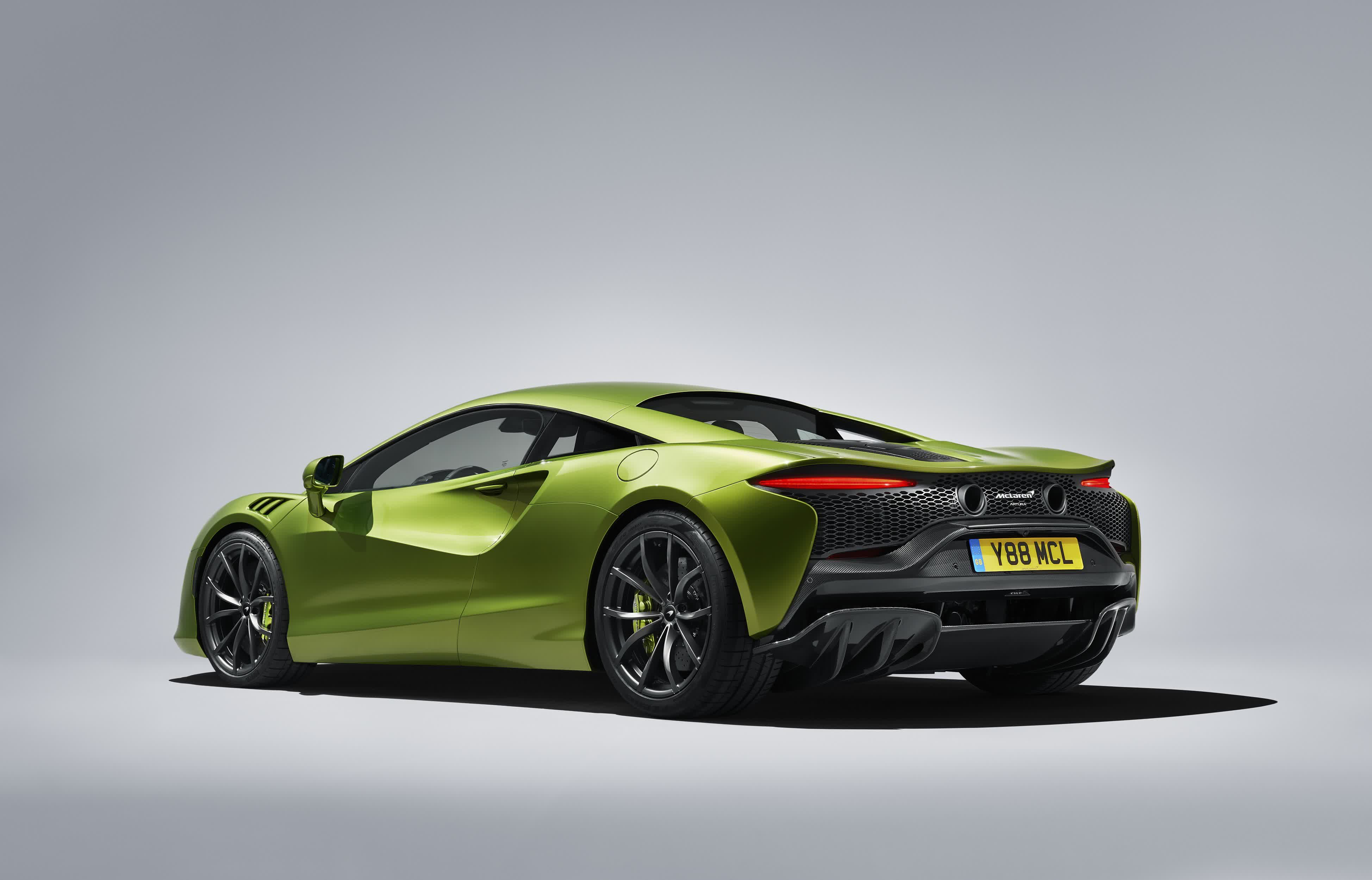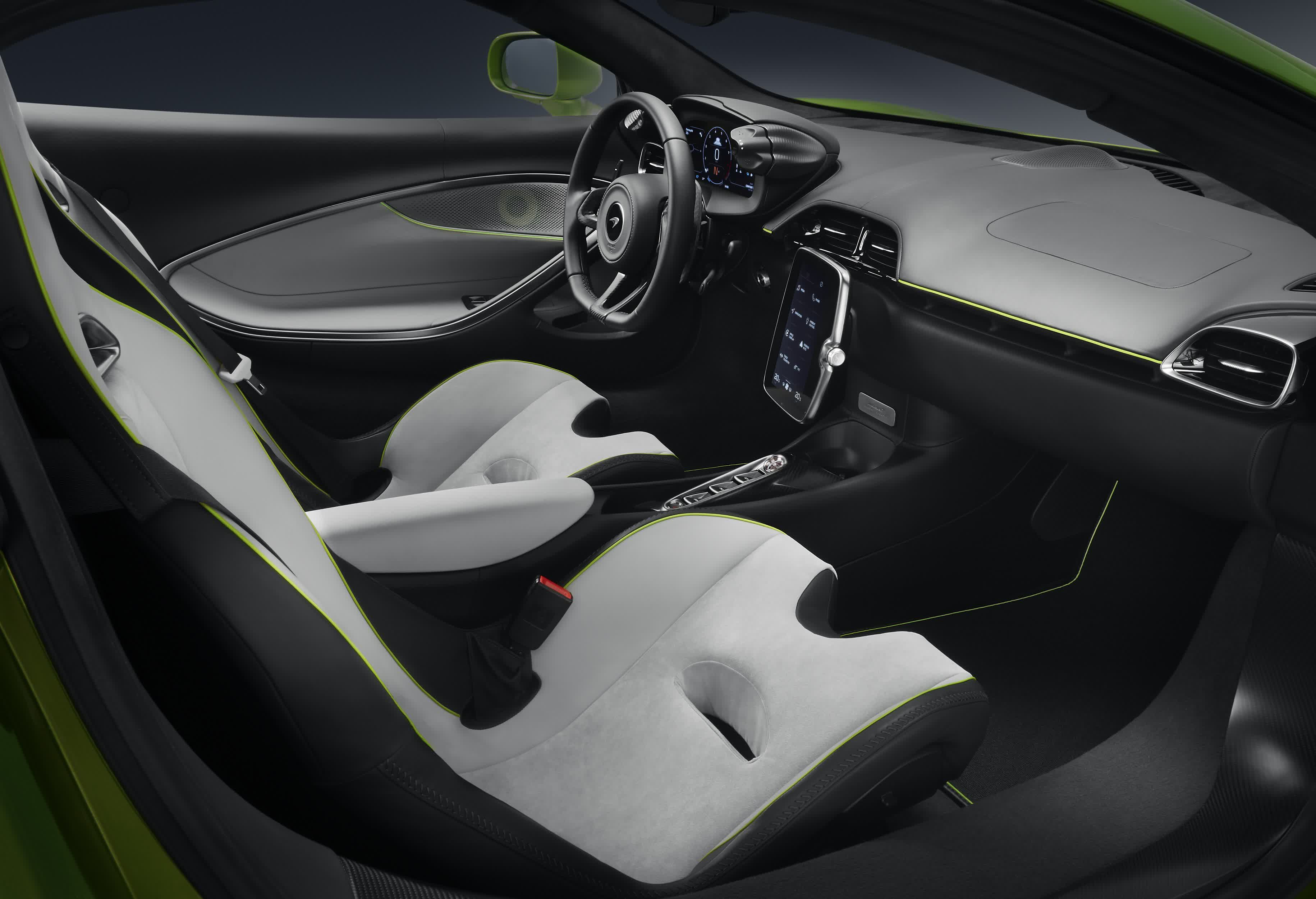[ad_1]
Forward-looking: McLaren is committing to more electrified models, starting with the new plug-in hybrid Artura, which is both plenty fast, yet environmentally friendly. While a plug-in hybrid isn’t new to the automaker, as the $1-million P1 and the $2-million Speedtail hypercars all paired a V8 with an electric power plant, the Artura is a bit more modest in comparison, replacing the (relatively) entry-level 570S.
McLaren is entering a whole new generation of vehicles with the recently revealed Artura supercar, which features a hybrid gas-electric powertrain, and a lightweight chassis. By incorporating an electric drivetrain, McLaren is able to drop two cylinders from the Artura’s gas engine, so we’re looking at a 3.0-litre V6 rather than a V8.
If that sounds mild to you, then consider the pair of turbos mounted to the motor. Combined with the electric motors, you get a total output of about 680 horsepower which is good enough for a sprint to 60 MPH in three seconds, while 120 MPH arrives in about 8.3 seconds. There’s a top speed of 205 MPH if you’ve got the racetrack with enough space.
You’ll find an eight-speed gearbox managing all that power and sending it to the rear wheels, but there is no mechanical reverse gear, rather the electric motor manages that task. Some are speculating that an all-wheel-drive version of the car may eventually make it to production. That’s something that can definitely be achieved with small electric motors.

As the Artura features a 7.4 kWh lithium-ion battery pack, it’s good for about 18 miles of all-electric range, when you’re not flogging it for top speeds. It takes two and a half hours to recharge that battery, and the vehicle can hit a top speed of 81 MPH in the silent E-mode, which is plenty fast.
Batteries are water-cooled obviously, ensuring optimal performance.
Thanks to a smartly designed new chassis, McLaren is looking to make a whole range of electrified vehicles, including a pure EV. But batteries are heavy, and weight is the enemy of speed and handling, two pillars of a supercar. Fortunately, the new chassis is light, thanks to the extensive usage of carbon fiber and aluminum throughout the platform. It weighs a surprising 3,300 lbs, not bad for a vehicle packing a twin-turbo engine in addition to an electric motor and batteries.
When it comes to handling, the McLaren Artura is the first vehicle from the automaker to feature an electronically controlled differential, which is smaller and lighter than the usual mechanical units. It also allows for greater and faster control of distributing torque to either of the rear wheels.

Of course, a car is more than just its bones and powerplant, and McLaren has provided a new interior, with a digital dashboard, and an interesting drive mode and gear selector affixed to the gauge cluster, ensuring its always easy to reach.
The cabin features a spiffy design, with attractive looking speaker grilles, ambient lighting, and different themes for the interior – some with plenty of leather, others with more lightweight materials. The car features technology within the cabin and out, like Apple CarPlay and adaptive cruise control. To enable all of that, the vehicle uses a zonal domain-based ethernet architecture. McLaren explains it: “The domain-based ethernet system utilises four controllers, each positioned in a key area within the vehicle to optimise data rates and cable lengths. Placed in the same zones as the loads they control, the controllers are connected, via ethernet, through a central gateway. Linked functions at the front, rear or across the vehicle don’t need independent wiring and control systems, but instead transfer data via this central ‘backbone’.”
The byproduct of this standard is to improve the electrical capabilities of the vehicle, while also decreasing the amount of cabling in the vehicle (by 25%) and reducing weight by 10%. The vehicle can also be updated over-the-air through at home Wi-Fi or a mobile hotspot.
Finally, how can we ignore the design of this supercar. It seems like an elegant evolution of the 570S that the Artura is replacing, with slim headlights and tail lights, larger, yet well integrated cooling ducts and an incredibly cool looking central exhaust that sits between the two lights.
It hits the road this coming September and should cost about $225,000. It has water-cooling, RGB lighting, and a high-speed connection making it the perfect company car for the editors at TechSpot, right?
[ad_2]
Source link